#Memorial Bench Ireland
Explore tagged Tumblr posts
Text

How do I pick the perfect garden bench?
When choosing the perfect garden bench There are several factors to consider to ensure it suits your needs and preferences.
Here are some tips to help you pick the ideal garden bench:
Purpose: Determine the primary purpose of the bench.
Size and Space: Consider the available space in your garden or outdoor area.
Material: Garden benches are available in various materials such as wood, metal, plastic, and stone.
Style and Design: Decide on the style and design that match your personal taste and the overall theme of your garden.
Comfort: Test the comfort level of the bench before purchasing it.
Maintenance: Consider the maintenance requirements of the bench.
Budget: Set a budget for your garden bench purchase.
Reviews and Recommendations: Read reviews and seek recommendations from friends, family, or online communities to gather insights on the quality and durability of specific garden bench models or brands. This can help you make an informed decision.
By considering these factors, you can find a garden bench that not only complements your outdoor space but also meets your functional and aesthetic preferences.
Click the benches below to take a closer look.
#Star Bench#Star Shaper Bench#Twin Bench Seat#Memorial Bench Garden#Memorial Benches for Garden#Memorial Benches Uk Reviews#Memorial Benches New Brighton#Oak Memorial Bench#Memorial Wooden Bench#Memorial Benches Cornwall#Memorial Benches Liverpool#Memorial Bench Designs#Memorial Benchs#Memorial Benches Edinburgh#Oak Memorial Benches#Memorial Benches Ireland#Personalized Memorial Bench#Memorial Bench Ireland#Memorial Bench Glasgow#Personalized Memorial Garden Bench#Memorial Benches London#Memorial Benches Glasgow#Memorial Bench Inscriptions
0 notes
Text
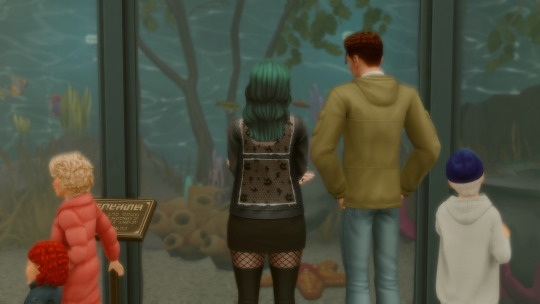
The low, blue light from the tanks is relaxing, meditative, even, and though the aquarium is loud with the sounds of small children rushing about and pointing out fish to one another, it’s still peaceful. Maybe it’s womb-like, I don’t know.
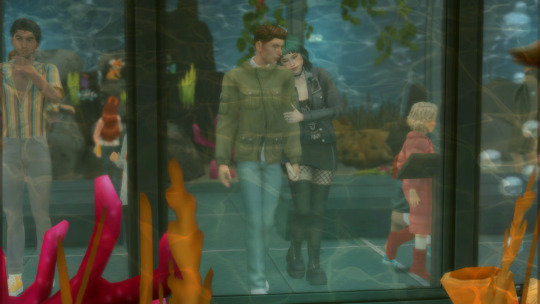
We stare at the turtles for ages and laugh about the description plaque, stating that all of these turtles were donated by families who no longer wanted them as pets when the Teenage Mutant Ninja Turtle craze passed.
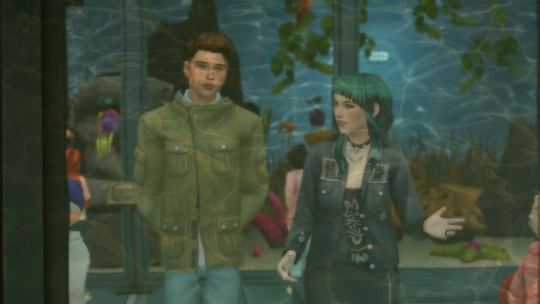
“They’re a bit like me,” Jen says, “my parents kinda donated me to Michelle’s family when the novelty wore off.”
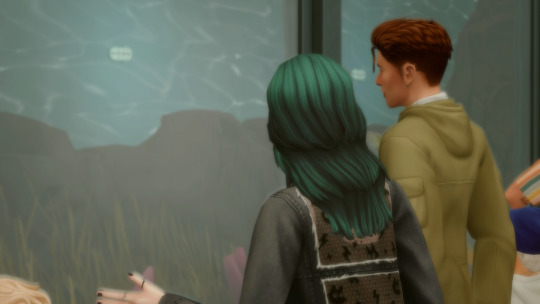
I don't know if she wants me to laugh, but I don't think it's funny. The smile slips off my face and suddenly these turtles are tragic figures, metaphors for the cruel, shallow nature of humanity. We just toss living creatures aside and flush them down toilets as soon as they are no longer trendy. Usually Jen would be impressed that I had such a liberal thought without first seeing it somewhere on the internet and adopting it as my own opinion, but I can sense it’s not really the right time to start a discussion about consumerism, or whatever.
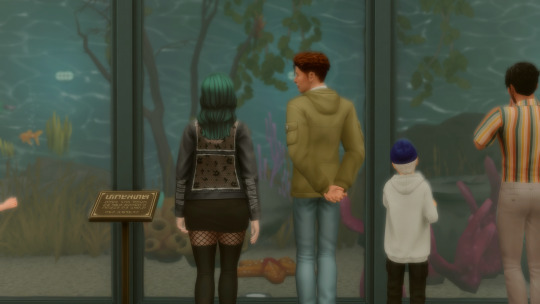
“I’m sorry about your mam today,” I say, “I would have expected she’d at least have the decency to say hello.”

Jen pauses for a long moment. I let the silence go on, and am beginning to think she won’t answer at all when she says, “I don’t know what I expected, to be honest.”
“It’s probably normal to expect your own mother to acknowledge you in public.”
“I just wonder if she’s missed me at all in the last two years.”
I don’t know what to say, “...I’m sure she has.”


“I doubt it, to be honest,” She stares dejectedly into the tank, “She’s had a lot of chances to reach out and make up, I just feel like she won’t do it if she hasn’t done it by now. I think that part of me thought she’d care more, I suppose, but then again I’m not really surprised that she doesn’t. She only had kids because people would have thought it was weird if she didn't.”
“Yeah but if she didn't then I wouldn't have a best friend.”
“You'd be best friends with some other loser if I didn’t exist.”
“Well, I'm glad it's you, is all.”
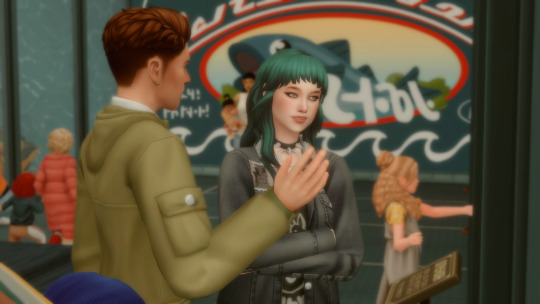
“I just think it’s a pity when… when love is supposed to be, like, unconditional, but it isn’t. You’re meant to love your kids no matter what, so I just think that if you’re going to give up on them as soon as they do, or… or are something that you don’t approve of then why would you have them?”
“I don’t think it’s that simple.”

“Ugh,” she shoves me lightly and turns to sit on a nearby bench facing another tank of fish, “Obviously I know, I was just saying.”
I join her, “I know, I feel the same way about my parents, sort of.”
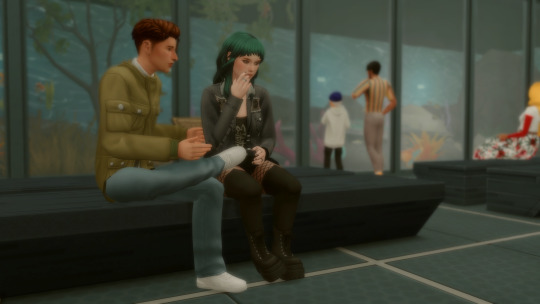
“Well, I mean, it’s different too, isn’t it? Because Chris and Colette actually do love you.”
I hesitate, “I think they love what I do for them and all, how convenient it is for me to be around and helping with things at home, but I don't know if that's proper love.”
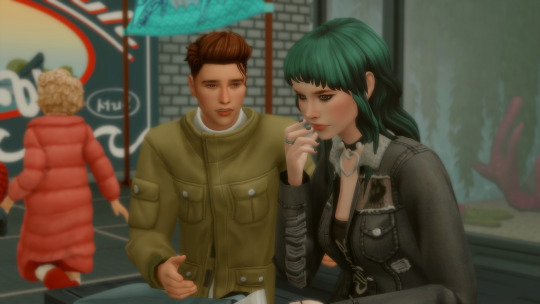
“That’s probably not everything you are to them, like, yeah, you help your mom out with the parenting thing when your dad refuses to be involved with it and that’s hard, but I don’t think they’d ever kick you out of the house and try to forget you were ever born. They brought you with them, didn’t they? When they moved to Ireland, and they didn't have to do that.”
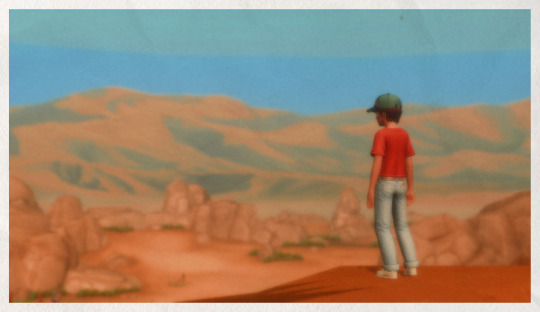
I wish they didn’t. Sometimes I wish they’d just abandoned me at aunt Maureen’s house and let me grow up like the normal American kid I was on track to be, doing normal American kid things like blissfully finger painting awful, shit butterfly pictures in elementary school and going to summer camps with campfires and raft building activities.
Memories of the desert are lit up in technicolour for me now, so clear that I swear I can still taste the air. It was drier, sweeter than the air here. It smelled different too, carrying some indescribable scent that only snapped back into my consciousness when I visited again two years ago and I've had a hard time not yearning for it since. Everything was beautiful. At the house that I used to call my home I would carry my breakfast out to the terrace, hopping on flagstone scorching already from the sun, and just look at the distant mountains, jagged blue, for ages, while the Rio Grande shimmered like a mirage in the dust land below.

It's because of Ivy that we left, though I still don’t know why my parents thought that bringing another child into the world, on purpose this time, would somehow fix all of the tears in the fabric of their marriage. And what about me? What kind of real, genuine good was lifting me out of the place that was making me so happy? But I know it's too late to waste time wondering, and if I ask them they'll just repeat what they've always said about how raising children would be better in Europe, as if they would even know.

“Yeah,” I say to Jen, “I guess that proves they love me.”
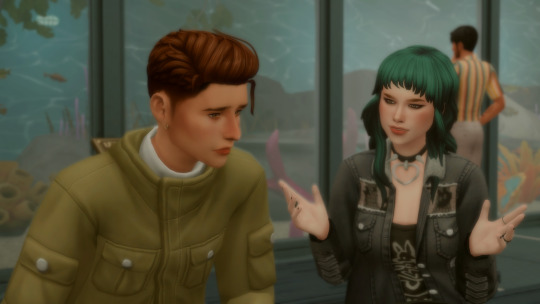
“I know what your problem is,” she says, and I’m curious enough about hearing it summed up that I look at her, the tanks throwing moving shapes and colours across her face, “You’ve just forgotten how to talk to them, like, how to really talk about how you feel, and they’ve forgotten how to do the same with you.”
“Hm.”
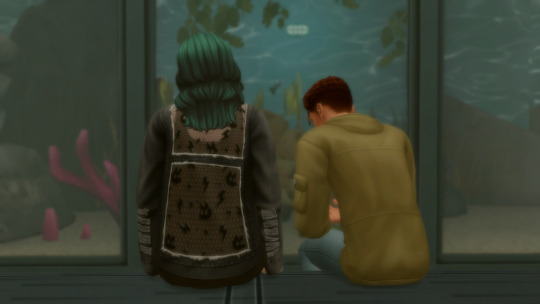
“You and I are good at talking, I think. We can talk about anything, even really hard things, even when we get upset about it, so I know you have it in you to do the same with your parents, you just won’t. You’re just too awkward now because you’re used to the way that it is, but I think if you just tried to change your habits then you’d probably find that they’d do the same with you.”
I nod. I don’t really know what she’s saying, but it sounds wise in that oh-so-very Jen way.
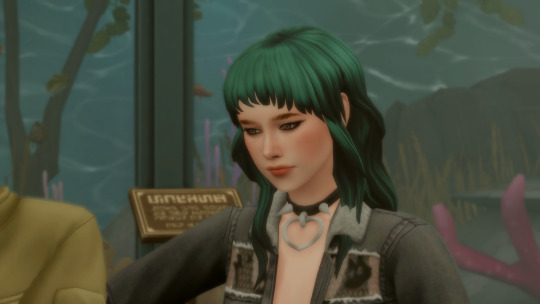
“Maybe your parents want to be close to you too,” she continues, “you really don’t know. Maybe they’re just scared that you’ll push them away, and I know you’re scared of the same thing so you’re all just walking around on eggshells trying very hard not to get hurt.”
“Do you think so?”
“Well, they could have just not had you, but they did. They got married because of you, and they wanted to bring you here with them. They still take you on holidays and buy you school supplies and nice clothes and fancy gifts, and even though you are the worst behaved boy of all time you don't get punished half as harshly as you should. Mine learned I was gay and changed the bloody locks,” she sighs, “You’re a lucky boy, actually, like it or not.”
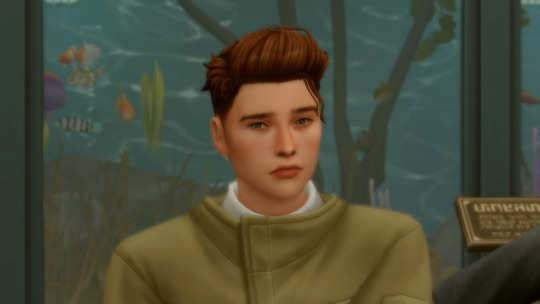
It's always hard to talk about her parents, not just because they were awful, but the casual way that Jen speaks of the event, like she's just repeating some bland school gossip she heard in the locker room. I know it hurts her. It must. The destruction they have done to her is immeasurable, and Jen has become so good at covering it all up, but I know her better than anybody. She’s vulnerable, sensitive and easily hurt, and even when her face doesn’t show it her eyes do. She knows I can tell, which is probably why she refuses to look at me for several moments and turns her face towards the shark tank to her left.
As for my parents, maybe she’s right, maybe I don’t know how good I really have it, and if I tried to talk to them more I’d be pleasantly surprised by the things they have to say. There are worse parents than mine, evidently.

We don’t speak again. I just sit close to her in silence while we watch the fish swim and weave between the rising bubbles in their tanks, fluid, free, mindless, until it is time to catch the DART home again.
Beginning // Prev // Next
#lucky boy 2009#name drop moment lmao#I like the way this aquarium looks but omg the stress of trying to figure out how to get actual fish into it?#and you can barely see them lmao#ain't that the way#tw: homophobia#ch: Jen#ch: Ivy
43 notes
·
View notes
Text







Princess Anne unveiling a new British Legion memorial bench in Market Square, Dromore, Northern Ireland on 13th September 2023.
📸 Dromore Chamber of Commerce on Facebook
51 notes
·
View notes
Text
OSCAR WILDE
OSCAR WILDE
16 October 1854 – 30 November 1900
Oscar Wilde was born in Dublin, Ireland and studied at Oxford. He wrote poetry and children’s stories which were published. He went on to become a successful playwright. One of his best-known novels, The Picture of Dorian Gray, was published in a magazine and caused a scandal for being considered as immoral. One of his most famous works was The Importance of Being Earnest (1895).
Wilde was married and had two sons; in 1891 he began a relationship with Lord Alfred Douglas.
Wilde, who was homosexual, was arrested in 1895 and was sent to prison for two years of hard labour for sodomy and gross indecency. It was Douglas’s father who saw to Wilde’s downfall as he wanted his son away from Wilde’s influence. Douglas accused Wilde publicly and Wilde responded by suing him, which put a target on himself instead. Under cross-examination Wilde admitted to affairs with men and lost his case. After he was released, he was bankrupt and was in poor health, he moved to France and lived in poverty. He converted to Catholicism on his death
Wilde died in 1900 aged 46, due to syphilis. He didn’t get a memorial in London until 100 years after his death. His memorial called ‘A Conversation with Oscar Wilde’ is near Charing Cross station, designed by artist Maggi Hambling and the funds were raised by the public. The memorial is made of green granite with a bronze head, of Wilde raising from his tomb. The inscription, ‘We are all in the gutter but some of us are looking at the stars.’ The memorial doubles as a bench which the public can sit on. The memorial was unveiled in 1998 by Stephen Fry.

#oscarwilde
3 notes
·
View notes
Text

Theresa May: Boris, Brexit and me
Four years and three prime ministers since she left Downing Street, Theresa May has written a book and loosened up (a bit). She tells Caroline Wheeler why she’ll never stop biting back from the back benches ��� and why Donald Trump wouldn’t let go of her hand
T
heresa May’s political awakening came when she was about seven years old. “I have a distinct memory of there being a knock at the door one evening and the door being opened to two chaps, one of whom had a big blue rosette on,” she recalls. She later learnt this was Neil Marten, the Conservative MP for Banbury, Oxfordshire, near where the May family lived. “My father took him and the chap who was with him into the sitting room and I went to join them and the door was shut firmly in my face. I was told, ‘No, this wasn’t for children. This was an adult thing.’ And maybe being shut out of the debate was the first spark.”
The daughter of a vicar, she was 12 or 13 when she decided she wanted to go into politics. “I just woke up one day and thought, actually I’d like to be an MP. I think that being an MP can be as much a vocation as being a teacher and I suppose perhaps [that idea] had been generated by an upbringing of public service.”
May became the country’s second female prime minister when she entered Downing Street on July 13, 2016, in the wake of the Brexit vote and David Cameron’s resignation. She lasted three years, announcing her resignation in May 2019 after failing to get her Brexit deal through parliament and her party performing poorly in the European elections. She left office on July 24, succeeded by Boris Johnson, the nemesis who plotted her downfall.
May says her resignation speech was the only time she ever displayed emotion publicly. “It wasn’t crying exactly, but when I gave my speech outside No 10 my voice sort of cracked a bit. I went back into No 10 and Gavin Barwell, who was my chief of staff, came out and said, ‘Well done.’ I said, ‘No, my voice went at the end and I’m really annoyed at myself,’ and he said, ‘No, no. That shows good emotion.’ ”
Since then the politician formerly known as the Maybot — for her sometimes robotic answers to questions — seems to be living something closer to her best life, making careful interventions from the back benches on the Sue Gray report into the lockdown-breaking parties held across Whitehall and retaining the protections her government introduced on modern slavery; and, once, wearing a glittering ballgown to the vote of confidence in Johnson in June last year. (She was on her way to speak at a dinner marking the Queen’s Platinum Jubilee — and has never disclosed which way she voted.)
In the weeks after she left No 10, on a walking holiday in the Swiss Alps with her husband, Philip, May first had the idea for a book. It would pull together the threads of many issues she had dealt with, first as home secretary and then as PM. Out next month, it is called The Abuse of Power, a concept she defines as institutions of the state and those that work within them putting themselves first — way ahead of the people they are there to serve.
With a title like that you might expect it to be payback time on Johnson, but the index points to just 13 fleeting references to her fellow former prime minister. Indeed, the closest she gets to score-settling is an attack on John Bercow, the former Speaker (and Remain supporter), whom she accuses of carrying out the biggest abuse of power she witnessed during the Brexit impasse over Northern Ireland: “We got to a point where the DUP were being positive. We were actually at the point of them being willing to say they would support the deal. The normal processes went on in terms of going to the Speaker to talk about the motion, and he wouldn’t let us put the motion down. So that meant we couldn’t have the debate, we couldn’t have the vote, and by the time we did the DUP had changed [their mind]. And so there was a point we could have had a vote to do Brexit on the basis of the deal. He took a decision that meant that didn’t go ahead.”
Bercow certainly added to the pressure on May, amid claims he was working with opposition MPs to thwart Brexit, but with the numbers stacked against her in the Commons, it is likely that even without his intervention she would have struggled to get her Brexit deal through.
Instead, her book focuses on events outside the chamber, including the Hillsborough stadium disaster, on which she commissioned Bishop James Jones to conduct a report in the wake of the verdicts of unlawful killing in the second inquest; the police cover-up over the murder of the private investigator Daniel Morgan; and the Grenfell fire. The book is dedicated to her parents, whom she says taught her the “meaning of service”. They both died before they could see her become an MP.
When I arrive at her house in the village of Sonning in her Maidenhead constituency, where she has lived for 27 years, May, 66, is in the kitchen discussing recipes with her aide. She has plucked one of hundreds of cookery books from her shelves and is leafing through it. In the centre of the sage-green room, which has large windows overlooking a well-kept garden, is a wooden table where we make ourselves comfortable. Philip, 65, a now-retired investment manager, pops his head round the door. The pair, who met at Oxford and have been married for 43 years, chat for a few moments, finishing each other’s sentences, before he scurries away to find a more private corner of the house.
May was born in Eastbourne, East Sussex, in 1956, the only child of Zaidee and Hubert Brasier, who was a Church of England vicar and the chaplain of a hospital. After studying at Holton Park Grammar School, which became the Wheatley Park comprehensive while she was there, May went on to study geography at St Hugh’s College, Oxford. She then worked at the Bank of England and the Association for Payment Clearing Services.
After two unsuccessful attempts to enter parliament, at 40 May became the Conservative MP for Maidenhead in 1997 as Tony Blair’s Labour Party swept to power. She spent much of the next 13 years on the shadow front bench. In 2010, when the coalition government won power, Cameron appointed her as his home secretary — only the second woman to hold that great office of state. She became the longest-serving home secretary in more than a century.
“They always say you had to be a communist in your youth, a socialist in your young adulthood and a Conservative as you got older,” she says. “I’ve always been a Conservative.” Her upbringing taught her the “importance of the freedom of individuals”. “It was the sense that, actually, how far you’re going in life is down to you. It’s about your talents and your willingness to work hard. To me the Conservative Party always provided the better environment in which people could succeed.” Her mother wanted her to be a nun. Did she ever entertain the idea? “No, absolutely not!”
Aside from Geoffrey Boycott, her cricketing hero, May’s father was her biggest inspiration. “His absolute conviction was that he was there for everybody who lived in his parish; I’m there for everybody who lives in my constituency. To him it was regardless of whether they were coming to his church or not. For me it’s regardless of how somebody has voted. Once you’re in that position you’re there to support and help them, to work for them.”
Growing up as the daughter of a vicar, she says, isn’t so different from being the child of a politician. “There was a combination there of public service and public speaking. In the vicarage there was very much a sense that we were there for other people.”
With such responsibility on young shoulders, did she ever feel the need to rebel? May famously claimed the naughtiest thing she had ever done was run through a field of wheat. “I haven’t had a rebellious childhood and suddenly transformed,” she says. She has also admitted that her guilty pleasure is eating peanut butter straight from the jar. “There’s no transformation on peanut butter — there’s a jar in the cupboard!”
In 1981, a year after her marriage to Philip, her father was driving to a nearby church to conduct the Sunday evening service when he was in a collision with a Range Rover on the A40. He died of head and spine injuries. A few months later May’s mother, who suffered from multiple sclerosis, also died. At the age of 25 May was an orphan. “I suppose it made me even more want to do something that they would have been proud of. Even though they wouldn’t see it.”
However much May might want her legacy to be the legislation she introduced for net zero emissions by 2050, or the Modern Slavery Act — which created new duties and powers to protect victims and prosecute offenders — she knows her premiership will always be seen through the prism of Brexit. She voted to remain in the EU and now believes her life in Downing Street would have been easier if she had been a Brexiteer.
“I don’t think it would have been easier on the negotiation side, but I do think — when I look back on it — that there were some of my colleagues who were Brexiteers who found it difficult to think that a Remainer would actually deliver Brexit,” she says.
Although she claims she is not trying to blame others for her mistakes, May believes her failure to get her Brexit deal through parliament was due in large part to people putting their personal interests above those of the country. “I started off with the view that we had to find a way of doing Brexit that recognised the concerns of the 48 per cent who voted Remain,” she says. “It became this atmosphere of both Brexiteers and Remainers trying to get what was their absolute aim, rather than a compromise that would better suit everybody.”
There were also serious global events for May to grapple with. She was the first world leader to meet President Trump when she travelled to Washington in January 2017, days after his inauguration. The visit took a bizarre twist when photographs emerged of Trump holding her hand as they walked through the White House.
“I have no idea why he did it. I mean, he sort of said, ‘Oh, there’s a slope so you need to be careful on the slope.’ Now whether this is because Melania always wears very high heels or not, I don’t know. I had heeled shoes on but they weren’t high heels. I thought, ‘I’m capable of walking down a slope, thank you very much,’ and the next thing I know he’s holding my hand.” She adds, laughing: “The best interpretation is he’s being a gentleman. But subsequently a lot of people said maybe he needed the support going down the slope. I don’t know. He just grabbed my hand and I thought he would then let go of it, but he didn’t.”
May’s tone becomes more serious when discussing the abuses of power Trump would go on to commit. She describes the storming of the Capitol building in January 2021 as “a wake-up call for us all”. “If you look over the years since the Second World War, there was a sense that liberal democracy was going to be sweeping the world, almost, and it was there and it was embedded and we could take it for granted. I think what happened at Capitol Hill showed that we can’t take it for granted.”
In 2018 she expelled 23 Russian diplomats after an attempt by Vladimir Putin’s regime to assassinate a former spy, Sergei Skripal, on British soil — in Salisbury — with the nerve agent novichok. She says this was the “right message” to send Putin. “In terms of the invasion of Ukraine, we have to look back to Crimea, and even before that to Georgia in 2008. I think arguably the West’s response did suggest to him that the West wasn’t willing to stand up for its values. The West turned its attention to China. So Putin, I think, felt that the West was more divided, wasn’t as coherent in terms of its support for its own western values. I think that all built up into an opportunity for him and he took it.”
Since the invasion, she says, “what’s happened is that the West did come together, the West did show its willingness to support its values, and rather than the division of Nato he’s seeing the expansion of Nato. He’s seeing the West made more coherent and he’s seeing the numbers of troops that Nato are willing to put on his border increase. So he has actually achieved the opposite of what he wanted.”
May’s premiership could have taken a different course had she achieved the landslide victory she had been on track to deliver after calling a snap election in April 2017. For much of the campaign she enjoyed a double-digit poll lead over Labour. But her manifesto pledge on social care, nicknamed the dementia tax, was widely blamed for extinguishing her lead.
May claims the decision to call the election was down to timing, as she was concerned that leaving it any later would have seen an election follow hard on the heels of the UK leaving the EU. “I was obviously extremely disappointed with the results. Surprised, because we’d thought that we would be able to get Labour Leave voters to switch, in order to get Brexit done.
“What happened in the 2019 general election [when Johnson’s Conservatives won 365 seats to Labour’s 202] was what we had expected to happen in the 2017 general election,” May reflects. “What we hadn’t realised is [the Labour leader Jeremy] Corbyn hadn’t shown quite sufficient negativity to Brexit that the Labour Leave voters decided to switch [to the Tories], which they did of course by 2019.”
Did she consider resigning in 2017?
“I felt I’d started something and I wanted to finish it. I said, ‘Look, I got us into this, I’m going to work to get us out.’ ”
May gently chides me for asking if she cried as she saw her majority evaporate, pointing out this is not a question that would ever be asked of a man. “I think often with women politicians, people want to pigeon-hole them. It’s either ‘You’re so soft that you shouldn’t be doing the job’, or ‘You’re a real hard harridan’, like they did with Thatcher. I didn’t feel discriminated against in the sense that most people would describe as discrimination. As with the Maybot thing, there is a different approach taken to women politicians.”
Disappointingly May today is wearing an uncontroversial turquoise cotton dress, not the £995 chocolate-coloured Amanda Wakeley leather trousers she wore the last time she was interviewed for The Sunday Times Magazine in 2016. “All those comments about ‘How does she spend so much on leather trousers?’ — they were lent to me for the shoot! It only goes to show how sometimes women are judged in different ways from men.”
She is used to the slings and arrows. At a crucial Tory party conference in Manchester in October 2017 she had a coughing fit as letters from the slogan behind her (“Building a country that works for everyone”) fell slowly from the wall, and was interrupted by a prankster waving a P45. A year on, in Birmingham, not long after the quality of her dance moves on an official trip to Kenya had been criticised, she hit back by strutting onto the stage to Dancing Queen.
Disappointingly May today is wearing an uncontroversial turquoise cotton dress, not the £995 chocolate-coloured Amanda Wakeley leather trousers she wore the last time she was interviewed for The Sunday Times Magazine in 2016. “All those comments about ‘How does she spend so much on leather trousers?’ — they were lent to me for the shoot! It only goes to show how sometimes women are judged in different ways from men.”
She is used to the slings and arrows. At a crucial Tory party conference in Manchester in October 2017 she had a coughing fit as letters from the slogan behind her (“Building a country that works for everyone”) fell slowly from the wall, and was interrupted by a prankster waving a P45. A year on, in Birmingham, not long after the quality of her dance moves on an official trip to Kenya had been criticised, she hit back by strutting onto the stage to Dancing Queen.
Disappointingly May today is wearing an uncontroversial turquoise cotton dress, not the £995 chocolate-coloured Amanda Wakeley leather trousers she wore the last time she was interviewed for The Sunday Times Magazine in 2016. “All those comments about ‘How does she spend so much on leather trousers?’ — they were lent to me for the shoot! It only goes to show how sometimes women are judged in different ways from men.”
She is used to the slings and arrows. At a crucial Tory party conference in Manchester in October 2017 she had a coughing fit as letters from the slogan behind her (“Building a country that works for everyone”) fell slowly from the wall, and was interrupted by a prankster waving a P45. A year on, in Birmingham, not long after the quality of her dance moves on an official trip to Kenya had been criticised, she hit back by strutting onto the stage to Dancing Queen.
One image that will for ever be associated with May’s premiership is the Grenfell tower block in west London engulfed in flames. At 12.54am on June 14, 2017, the fire brigade was called to the blaze in Kensington. Within half an hour the flames of the burning tower lit up the night sky. Seventy-two people died. May was still exhausted in the aftermath of the election six days before. “I remember the next morning standing with private secretaries in the outer office just looking at the television screen,” she says. “The building was still burning. You almost couldn’t comprehend that this had actually happened.”
She was criticised for failing to meet victims during her first visit to the site, but returned to Grenfell to meet them privately in the days and months afterwards. “I think it’s so important because often what happens is you get an event like that, a tragedy like that, and politicians turn up on day one, in my case day two, and when the photos are taken and so forth, they go away and nothing more is heard from them.”
Grenfell touched a nerve with May because, she says, it appeared to be the physical manifestation of many of the “burning injustices” she had vowed to correct during her first speech as prime minister. The abuse of power here was the “belittling of a group of people because they happened to live in homes owned in part by the state. Those people living there felt they’d been beating their head against the brick wall of authority for many years in regards safety of the building.”
May had pledged to make Britain a country that “works not for a privileged few, but for every one of us”. This included plans to tackle the lack of affordable housing, fixing broken markets to help with the cost of living and stamping out racial and class disparities. “I think there were important things that I was able to do that addressed some of the specific social injustices. Setting up the Race Disparity Unit [which collects, analyses and publishes government data on the experiences of people from different ethnic backgrounds], for example, and recognising that a significant part of our population have often had a very different experience of living in the UK from the rest of us.”
As part of my trip to Maidenhead I join May on a visit to Thames Hospice. She is a frequent visitor to the bright, airy building overlooking a sailing lake, and was there when the Queen opened it in July last year — one of her last public events before she died in September.
It is impossible to miss the broad smile breaking across the face of Aaron Sennick, a 20-year-old with complex medical conditions, when he sees May. At one point he gushes: “Thank you for everything you have done for this country.” May looks more comfortable sitting beside Aaron’s bedside than she ever did at the dispatch box.
Aaron regales her with stories of his voluntary work and his burgeoning social media career. In return May tells him she is a technophobe and has only in the past few months given up her beloved BlackBerry and switched to an iPhone. He asks about her favourite memory as prime minister. May reveals it was in 2018 when she met the British diving team who had rescued a young football team from a cave in Thailand. She tells Aaron that she often found the most special moments were when ordinary people were recognised and celebrated for doing extraordinary things.
She is planning to fight the next election but is happy away from the front benches. “I don’t think it’s a good idea for prime ministers to go back,” she says. “I had 13 years in opposition — 12 of those on the front bench and then nine years on the front bench in government. So actually it has been rather nice to go back to the back benches and to do the job of being a constituency MP.”
After she left Downing Street, her husband, Philip, was awarded a knighthood in recognition of his political service. He was nominated by Johnson. Although his title means that his wife is now Lady May, she does not use it. May remains tight-lipped on whether this is because she is waiting for a peerage of her own.
“I think there is a need for PMs to think very carefully about the numbers that they’re putting into the Lords,” she says — the closest she gets to possible criticism of Johnson, who created 87 new peers during his tenure as prime minister (and awarded 7 more in his resignation honours), compared with May’s 43. “I actively tried to ensure that I restricted my list throughout my time as PM,” she says. Liz Truss’s list, after her 49-day premiership, is imminent.
Despite Truss crashing the economy, does May think Rishi Sunak can deliver on his promises and win the next election? “What people want to see is a prime minister — which they are seeing in Rishi — who has understood issues that matter to them and is putting in place what he believes will deliver on those issues,” she says. “We all know in politics that other things happen that can knock you off course, but I think what people want to see is that you are actively doing your best to deliver.”
May says she is “very pleased” that Sunak has not yet swayed from the 2050 net zero target she introduced, insisting that net zero is “the most important economic opportunity of the 21st century”. She adds: “Lots of people talk about the costs but don’t talk about what would net off those costs in terms of positives for the economy, for jobs, for people and so forth. There is a road in Maidenhead that is social housing that recycles rainwater — it has ferns on the roof to capture the rainwater better and so forth. It has all sorts of energy-efficient elements and the people who live there have seen their energy bills go down significantly. So I always say that what’s good for the planet can be good for your pocket.”
She says the argument will not be made by “lecturing people”. “We won’t achieve net zero if all we do is tell people you can’t fly, you can’t drive, you can’t eat meat. Actually, what we’ve got to do is say, you can play your role, your part in a number of different ways on a day-to-day basis. Government must play its part and business must play its part as well.” She adds: “If you look at everything that’s coming out of the Climate Change Committee and so forth, we really do have to address this issue. You can’t get to 2048 and say, Ooh right, we’ve got a target in two years’ time, let’s do this because that would be even costlier.”
May is less supportive of Sunak’s plans to remove the protections for victims of slavery who enter Britain illegally, and she defied a three-line whip after a debate on the issue in July. “My key concern is around modern slavery,” she says. “Because if we’re going to stop it we need to break the business model. That means catching perpetrators. To catch perpetrators you need victims to be willing to come forward, identify themselves and give evidence and I worry that what’s now in the Illegal Migration Act, and indeed the Nationality and Borders Act, together will lead to a situation where fewer victims will come forward.” She is preparing to launch a global commission on modern slavery, made up of CEOs, former world leaders, academics and civil society leaders. “There’s a sort of unfortunate thing in politics that politicians will often focus on one big thing at one point and then something else happens and the energy goes out of the first thing,” she says.
However, May will combine her new role with being a backbench MP. Even as prime minister she would go knocking on doors as often as she could in her constituency. Why? “You should never forget that even if you get to the very top job you’re only there because you have been elected as an MP.”
In her book, in one of the few passages to mention Johnson by name, she writes: “Another source of anger was the perception that somehow MPs were able to get away with breaking the sort of rules which they would expect everyone else to follow. This was to have another manifestation under Boris Johnson’s premiership, when those in 10 Downing Street and elsewhere in Whitehall were found to have broken Covid pandemic lockdown rules. The idea that there has been one rule for the public and another for MPs provokes public cynicism and leads increasingly to the charge of hypocrisy. In other words, why should we do what you say when you don’t do it yourself? Above all, it shatters any sense that MPs are leaders in society. Yet I still believe we have a responsibility to try to show such leadership. It may be harder in today’s world, but that doesn’t mean we shouldn’t try.”
May believes that in order to restore integrity to politics, there needs to be an understanding that being a politician is a position of public service rather than power. “What you fundamentally need is for MPs not to think that they’re a species apart simply because they’ve been elected,” she says. “It’s that sense that, for some MPs, they are in a position of power because they’ve been elected, that they’re special, that they are a breed set apart. I think we have to change that thinking because, basically, being an MP is a job.”
The Abuse of Power by Theresa May (Headline £25). Read an exclusive extract in The Times tomorrow.
8 notes
·
View notes
Text

In Galway, Ireland, the reader meets actor Jonah Hauer-King in a pub. They have a magical night of laughter, dancing, and deep conversations. Despite parting ways, they hold onto their connection and hope to meet again.
As I walked into the crowded pub in Galway, Ireland, the lively atmosphere engulfed me. The sound of traditional Irish music filled the air, and laughter echoed from every corner. I was drawn to this place, hoping to experience the magic of the Emerald Isle firsthand. Little did I know that this night would change my life forever.
Finding an empty spot at the bar, I ordered a pint of Guinness and savored the rich taste as I observed the vibrant crowd. I couldn't help but feel a sense of adventure, eager to explore every nook and cranny of this enchanting city.
Lost in my thoughts, I suddenly felt a tap on my shoulder. Turning around, I locked eyes with a handsome stranger standing next to me. His tousled hair and mischievous smile made my heart skip a beat. It was Jonah Hauer-King, the actor I had admired from afar.
"Hi there," he said, his British accent adding an extra charm to his words. "Mind if I join you?"
I smiled and nodded, feeling a mix of excitement and nervousness. Jonah effortlessly slid onto the stool beside me, and we struck up a conversation. He was warm, down-to-earth, and genuinely interested in getting to know me.
As the night wore on, we shared stories and laughter. We danced to the lively music, our bodies moving in sync with the infectious rhythm. The chemistry between us was undeniable, as if we were two souls meant to meet on this fateful night.
We ventured outside the pub, hand in hand, and embarked on a moonlit walk through the picturesque streets of Galway. Cobblestone paths and colorful houses adorned with blooming flowers created a fairytale-like setting. Time seemed to stand still as we strolled along, lost in each other's company.
Jonah's laughter echoed through the narrow alleys, and he pointed out hidden gems only a local would know. We stumbled upon a quaint café and decided to stop for a warm cup of tea. The cozy ambiance provided the perfect backdrop for us to continue our conversation.
As the night came to a close, Jonah and I found ourselves sitting on a bench by the Galway Bay, gazing at the starry sky. The waves crashing against the shore provided a soothing soundtrack to our moment of tranquility.
"I feel like I've known you forever," Jonah whispered, his voice filled with sincerity.
I smiled, feeling the same connection. "It's like we were destined to meet here, in this beautiful city."
He gently placed his hand on mine, his touch sending shivers down my spine. Time seemed to slip away as we lost ourselves in an endless sea of conversation and stolen glances.
Eventually, we reluctantly realized that it was time to part ways. We exchanged contact information, promising to stay in touch and maybe, just maybe, cross paths again.
As I boarded my flight back home, memories of that magical night in Galway swirled through my mind. Jonah Hauer-King had entered my life like a shooting star, igniting a flame of possibility and leaving me yearning for more.
Months passed, and our connection remained strong. We nurtured our budding relationship despite the distance, sharing stories, dreams, and aspirations through countless late-night calls and text messages.
One day, fate would bring us together again, and we would create new memories that rivaled the enchantment of that night in Galway. Until then, we held onto the hope that love knew no boundaries, and that our paths would inevitably intertwine once more.
There may be a part two to this!! 🙊 what do you guys think? 💖
tags; @anonyymoouussssss
#jonah hauer king#jonah hauer king imagine#prince eric#prince eric imagine#the little mermaid#jonah hauer king x reader#prince eric live action#the little mermaid live action
11 notes
·
View notes
Text
A Battle of Ideals Epilogue
Part 6
Pairing: Chris O' Doyle( Free Fire) x female OC
Warnings: graphic description of blood, wounds, some violence, swearing cause that's all they did in that movie, enemies to lovers kinda?, h/c, English is not my first language.
Two months later
"How much"?, Chris asked fumbling with the pack of his cigarettes.
"It will be 25.3 pesos sir", the old seller mumbled, giving him his fruits.
Chris sighed drumming his fingers on the bench. The weather was terrible that day-some more of that goddamned heat, and he'd have to cut his hair. He shoved the change down his pocket and run to their house.
He still didn't feel safe enough to walk around Cuba during daylight-the american prison was too close. Besides, after a long day at the fields, his feet lead him eagerly to the shoreline.
As the sun began to set, he saw Amara swimming alone in the shallow, making bubbles at the water, throwing droplets high in front of her as if it was raining.
"For fuck's sake woman"!, he shouted at her, dropping the paper bags on the ground. "Can't you just stay in your fucking bed"?
"I got warm, I thought I'd go for a swim. Nothing dangerous in that"!
"Why can't you just wait a little longer?! What if it becomes infected"?
"What if you die from those fucking cigs you smoke all the time"?, she answered as she walked to him.
She had taken the bandage off two weeks ago, an ugly scar marking the left side of her abdomen.
He was marked with scars everywhere, memories too hard to forget.
"We've got rice from yesterday, and I caught some fish too", she murmured, hugging him.
"I thought you were busy with that boy that broke it's leg".
"He'll be fine. I've treated worse wounds. -Oh, and remember that lady that gave birth to twins"?
"The woman you saved from certain death"?, Chris laughed. "Her husband thinks you're the Messiah or something".
"That's why they brought us some of the best cigs they make".
Chris's eyes lit up with childish joy as he headed inside the house.
His hands flew across the kitchen table, searching for the package. A large coconut rolled to the floor, dragging two mangos with it.
Amara winced at the sudden noise as she hugged him from behind. She was careful with his ribs as a reflex, even though he was now fit enough to work at the sugarcane fields.
"Where did you put them"?, he mumbled softly, trying to seduce her. He knew she loved his deep voice, but Amara stood her ground.
"I gave them back. I get my salary at the hospital, there's no need for extra rewards. Especially if said rewards harm your health".
"Oh will you stop with that woman…I've been through hell only to be denied a cig"!
"There's better things waiting for you inside", she smiled, dragging him to the bedroom.
It was a small house, the one they had. Poor, and not too steady. But it was homely, unlike either of them had had for a long time. They had made hanging decorations with seashells and stones they'd found by the shore, they had painted the walls a faint, joyful blue.
Their bedsheets were clean, and fresh, the fan on the ceiling keeping the temperature somewhat low.
Chris caressed her body with his fingertips, shoulder, to ribs, to her stomach, letting his warmth spread to her recently healed side.
She had her eyes closed, but he knew she wasn't sleeping. He helped her onto him, so she would be close.
Somehow it was worse than before, the stillness and the calm. Everything was at bay, so he didn't know what to watch out for. He needed her close, to know she was safe.
"How long do you think"?, she mumbled sleepily. "Until we leave".
"I don't know. It's not bad here. A slow life, simple. Safe".
"I heard you whisper in your dream yesterday Chris", she scolded him. "Apologizing to Aidan and Mike…"
"It's okay, it's just dreams", he rushed to reassure her. "But I wouldn't mind going back to Ireland. At some point".
Amara held her breath, trying to navigate that weird feeling inside of her.
In the past two months, they had kept a watchful eye of the news in America, Britain and Ireland. The MI6' plan to debilitate the IRA had worked just fine without Chris' information-7 of their members were down, another gun deal had been prevented.
She looked him in the eyes, noticing her reflection back on his. They were bluer than the morning sea. Amara saw it clearer than ever: love, in that weird form that could be proven powerful, destructive.
"I don't care where we are. Or what we do. As long as I am with you".
Chris cupped her face bringing their lips together.
"Then girl", he said, his voice hoarse with emotion, "I think we'll just wait. Trouble finds you even in the most peaceful places".
"The future is uncertain but the end is always near", she smiled, hand resting on his temple.
3 notes
·
View notes
Text










A fine aspect in fit array Neither to mean nor yet too gay Shews who is best.. George Herbert.
Cartmel Priory; a big place (please see my other post in partnership with this one). After a sweep around Morecambe Bay (please see here and here), I climbed Hampsfell (please see here), from which 1 was taken, 2 being Hampsfell from below.
From the hill, looked down on Cartmel, where I enjoyed Easter Sunday evensong (this post was begun in March 2024 but only now written, sorry) and had a late lunch.
Nestled in wooded hills, this is an obvious place for a village and was the home of Cartmel Priory which has been a place of worship for over 800 years since its foundation by Norman baron, William Marshall, in 1190.
At the Dissolution of the Monasteries in 1536, the priory was disestablished, though it carried on its work as a parish church; btw,- Perpendicular restorations carried out just before then give the lie to the Protestant claim that religion was moribund in the late Middle Ages; here it was thriving, which all the charity work of the monks, before being torn apart by Henry VIII.
The Preston family, then the Lowther family and then the Cabendish family, who became the secular landowners here from their base at Holker Hall, ensured that all was not lost as they restored the priory, which had fallen into desuetude after 1537, as a parish church (which, of course, it still is).
In 1867, the church entered the Victorian age when EG Paley restored it, adding a Gothic touch that, in the best Victorian style, is serious but not stodgy. (There isn't much natural light here, which added to the beauty of Easter evensong, though it does take away some of the shine of the photography; please go there yourself to see it at its best).
Here one can see a memorial to Frederick Cavendish, son of William, 7TH Duke of Devonshire, who was assassinated in Ireland in the Phoenix Park murders of 1882. The Cavendish family held a huge empire centred on Chatsworth, (which they still own, along with Holker) which at its height spanned Staffordshire, Derbyshire, Sussex, and much of this area including the industrial town of Barrow.
Vicars included Thomas Remington (vicar from 1835 to 1854), a sensible man who walked up Hampsfell each morning, and who blessed us with the Hampsfell Hospice which should be sought out.
On my way to evensong, I had seen a further sign of redemptive sacrifice, the inevitable war memorial, in memory of the 16 dead of World War 1 and the three dead of World War 2.
The farming that had always been the mainstay of the Grange economy, and is still important now, was joined by tourism after the railway station opened in 1857 (Paley worked on a fine rebuilding of the station buildings in 1864) and sitting on a bench in a graveyard seemed an odd thing to do in the spring sunshine, but gave a feel of this place as it was been for hundreds of years and doubtless will be in the centuries to come.
1 note
·
View note
Text
Danny Care, the scrumhalf for England, announced his retirement from international rugby after a career spanning 15 years and 101 caps. He made this decision following his participation in all five matches of the Six Nations tournament and reaching his 100th cap in a game against Ireland, where he set up the winning drop goal. Care expressed that the past year has been one of his favorites, full of cherished memories with the England team. Starting with England Sevens in 2006, Care made his test debut in 2008 against New Zealand and scored his first test try in Christchurch. Despite not being selected by Eddie Jones in 2019, 2020, and 2021, Care persisted and was recalled for the victorious tour of Australia in 2022 under Steve Borthwick's coaching. Throughout his career, Care won three Six Nations titles with England and participated in the Rugby World Cups in 2015 and 2023, where England reached the semifinals. Despite being sidelined by injury in 2011 and dropped from the squad in 2019, Care remained dedicated to reaching 100 caps for his country. He expressed gratitude towards his coaches for their belief in him and thanked the England supporters for their unwavering backing. Care acknowledged that walking out onto the field at Twickenham in front of the fans was a feeling like no other and held deep significance for him. Having spent more than a decade representing England in international rugby, Danny Care is recognized as the sixth Englishman to achieve a century of caps. His career highlights include helping the England Sevens team win a Commonwealth Games silver medal in 2006 and playing a pivotal role in various Six Nations campaigns. Care's ability to impact games off the bench as a replacement player was a testament to his skill and adaptability as a scrumhalf. Despite facing setbacks in the form of not being selected for major tournaments, Care's perseverance and determination led him to reach the milestone of 100 caps and leave a lasting legacy in English rugby. Care's retirement marks the end of an era for English rugby, with his experience and leadership on and off the field being valued by teammates and coaches alike. His contribution to the England team, both in terms of his playing ability and his mentorship to younger players, has been highly appreciated. Care's departure from international rugby leaves a void that will be difficult to fill, but his impact and influence on the sport will endure. As he reflects on his career and the memories made with the England team, Care leaves behind a legacy that will be remembered by fans and players alike for years to come. In conclusion, Danny Care's retirement from international rugby signifies the end of a distinguished career filled with milestone achievements and memorable moments. As he bids farewell to representing England on the international stage, Care leaves behind a legacy of dedication, perseverance, and leadership. His impact on the England team and the sport of rugby as a whole will be cherished and celebrated by fans and teammates. Danny Care's retirement marks a milestone in English rugby history and serves as a reminder of the enduring legacy he leaves behind.
0 notes
Text










Contrast: My home in black and white
We were tasked with taking a compilation of photos in order to represent the idea of home and to demonstrate contrast through black and white images, and the above photos are my interpretation of this assignment. I did thoroughly enjoy taking these photos but during the planning process I had to consider what kind of direction I wanted to take. I am from Ireland originally but spent most of my life living in Abu Dhabi, and now live in Edinburgh, so I have quite a few places that I call 'home'. What I would say is that home is where my family is, but unfortunately they are scattered around the world currently and so I decided that I was going to have to go in a different direction for this assignmnet. This resulted in the decision to photograph my two 'homes' during my time in Edinburgh, which just so happened to be connected door to door by the canal. With this, I thought it would be interesting to demonstrate my move between the two as a walk along the canal from home to home, connecting my time here as one.
Image 1 - This photo is of the front of Bainfield, which was the university accommodation that I stayed in for the first year of my life in Edinburgh. The photo both brings back feelings of joy and despair as living there could be quite... messy sometimes. However, it was still one of the best years I've had where I met some of my best friends and made incredible memories. I took the photos during the day as I wanted to have the 'bright' (scottish bright) sky with the dark lines on the building to try and show some contrast within the image.
Image 2 - As you can see, this is a closer shot that shows the name of the building, but also shows the window to the room that I stayed in while there. That room again holds countless memories, and was incredibly important to me as it was my own space in a flat full of people. Sometimes you can loose your individuality when you live in the same copy-pasted room as everyone else, but that room was mine and as much as it was small, I loved it completely. Again the dark lines on the building in comparison to the lighter sign was an attempt at showing some more contrast in a more up-close image.
Image 3 - In this shot you can see the canal for the first time, as well as the bench that me and my friends spent half of our time on whenever we went out for a cigarette. It was almost like a comfort spot where we would look out on the canal and just have a breath of fresh air outside of our sometimes very stuffy flat. I tried to use the dark trees compared to the subtle highlights in the flowers on the grass or the patterns in the clouds to demonstrate contrast again.
Image 4 - This image is of the bridge I walked across to get to uni during my time living in Bainfield. I thought capturing this imagine demonstrated part of the significance of my first home, as university was the reason I ended up moving there. I probably should have taken a few more trips across this bridge to actually attend all my classes but I digress. I think I lowered the exposure on this image a little too much as the darker sections almost become unintelligible and blend together but in comparison to the bright sky I thought it worked well.
Image 5 - In this shot you can see the canal which looks very nice and picturesque bla bla, but what it doesn't show is just to the right out of frame, is a turn off to a park that my friends and I used to walk to at night when we were bored during the last 2 months of our time at Bainfield while we were finished with uni. We used to sit on the benches with a speaker for a while and we always liked to check if there was new graffiti on the bridge. I think this shot is a little too under-exposed as the darker half becomes illegible similar to the last image in parts but I still really like it.
Image 6 - This photo is slightly less significant than the rest as it is more of a passing spot than a place that is massively significant to the theme "home". Similar to the last two shots, it is along the canal but closer to my current flat rather than my old Bainfield one. I thought this spot looked really beautiful on the day I went out to take these photos, with the shrubbery and the water. I also really liked how the sky reflected on the water so you have these bright white and grey spots mixed in with the dark trees and canal.
Image 7 - This is the spot right before the bridge to the stairs that lead you to my flat. I thought the 'caution' sign was kind of funny because its both eerie and 'symbolic' in a way at the same time. It looks sort of 'abandoned city/dystopian' which I really like, but also kind of a warning towards the passage of time and how things move on (not really sure how to describe it, I'm trying to be deep and edgy). I thought the movement in the clouds allowed for some layering to the image as well as a nice bit of contrast with the cat's eyes on the dark pathway.
Image 8 - And there it is! My flat! A little far off in the distance but you can see it if you look in the bottom right hand corner of the screen just above the Sainsbury's sign. The three lights in the building belong to my block of flats, and we're right at the top. I got quite lucky with this shot as a train came passing right as I took it which filled out the dark left hand corner. I also thought the big line of clouds made a cool split almost into 3rds, bright on top, a little darker in the middle, and darkest at the bottom.
Image 9 - This was taken on the 'main' street just before you turn off onto my road. You can again see the light coming from the building just to the left of the centre. To be honest, this is probably the shot I like the least as it isn't very complex in terms of its contrast and also isn't as good looking as some of the areas that I was taking photos in. I think if I were to have had some other light source in the bottom half of the image it may have translated better but either way, still significant towards my home.
Image 10 - And here we are. At the end of our walk between the two places I have called home in Edinburgh. I have always loved the big tree outside our front door and watching switch from season to season always makes me smile. It's a cherry blossom so during the summer its lovely and pink but at this stage it was just before it started to lose its leaves. This allowed for light to peak through the branches and give a nice sense of contrast to the image through the backlight coming from the building.
0 notes
Link
Advent Memories of Ireland on Retreat https://crisismagazine.com/opinion/advent-memories-of-ireland-on-retreat?utm_source=twitter&utm_medium=social&utm_campaign=novashare via @CrisisMag
0 notes
Text

What are the best types of wood to use for an outdoor table or bench top?
When oak is allowed to weather naturally, it develops a stunning silver-grey patina, which many people find highly desirable. A wooden memorial bench generally acquires a silver hue as it ages, but oak, in particular, takes on a bright and striking silver color when kept clean. This appearance complements both the charm of a sprawling country garden and the sturdiness of stone-built architectural settings.
To preserve the silvered look and protect the oak, a straightforward maintenance routine is all that's needed. For further information on this, please refer to our aftercare page
#Memorial Benches Uk Reviews#Memorial Benches New Brighton#Oak Memorial Bench#Memorial Wooden Bench#Memorial Benches Cornwall#Memorial Benches Liverpool#Memorial Bench Designs#Memorial Benchs#Memorial Benches Edinburgh#Oak Memorial Benches#Memorial Benches Ireland#Personalized Memorial Bench#Memorial Bench Ireland#Memorial Bench Glasgow#Personalized Memorial Garden Bench#Memorial Benches London#Memorial Benches Glasgow#Memorial Bench Inscriptions#Memorial Garden Benches Uk#Memorial Bench near Me#Memorial Benches Hartlepool#Memorial Benches Belfast#Memorial Benches with Engraving#Memorial Bench Sheffield#Memorial Benches South Wales#Memorial Benches Derbyshire#Best Memorial Benches#Diy Memorial Bench
0 notes
Text
MICHAEL
My friend died yesterday. It was sudden and unexpected and a big nasty shock. He was seventy and when I last saw him a year ago he was in really good shape, both physically and in himself and there was not the slightest hint that he would find himself very suddenly in hospital with just days left of his lovely, really lovely life. Michael, Mike, Bicky Byron/Bracken was one of a very small number of people that everybody loves and nobody dislikes. Yes, he was one of those ‘Special People’ whom the Gods showered with stardust. He was a born entertainer and a fine minstrel and he was great to know.
We met in 1966 at a country grammar school and we quickly saw that we had three things in common: music, football and a dogged determination to not conform. In the time we spent at school we became quite close and we encouraged and educated each other in those three arts. We were soon joined by Steve and Crumpy and together we established ourselves as the naughtiest boys in the school, aided and abetted by the naughtiest girls in the school (Mal, Carol, Pam, that’s an endearment!) Were we bad? Probably, but I don’t think there was malice in us. Certainly not in Mike. My overriding image of him is of that cheeky, confidential grin and chuckle.
Though I lived a few miles away in a neighbouring town we hung out together as much as we could. There were plenty of buses back then. We would play records and talk about the music. It was the heyday of the Blues. White kids took on the soul of black music and made it their own. The ‘Stones, John Mayall and the Animals really kicked it off but when Cream became the first Supergroup and Clapton was God and then Jimi Hendrix came along it was a truly golden time. Me and my mate Mike lapped it up, listening and analysing it endlessly. Mike was really into Rory Gallagher and that Irish influence that was so important throughout his life. He taught himself to play guitar. I didn’t have the patience and just listened.
Equal first love was football. Back then Mike supported Wolves, though later he switched to Manchester United. I was always Spurs; but more importantly we followed our local team Swindon Town and they were enjoying a few years of success. They had good players and the atmosphere was magical at times. We went to all the home matches and sometimes the away games as well. Neither of us had any money so Mike would often hitch-hike. I usually prevailed on parents to get the coach or train. One particular match at Walsall sticks in the memory for being pelted with rocks and lumps of tar by the home fans all the way back to the station. Such was life.
Then in 1969 a wonderful supernova exploded for us as ‘The Town’ defied the odds against Arsenal and won the League Cup. Of course we were there. Of course we were ecstatic. Then Mike did something that shook a few trees. That night he and his mate Dennis went up to the school and wrought a bit of havoc. They daubed SWINDON on the outside wall of the music room in white gloss paint, the letters so large they were visible from the downs a couple of miles away. They threw benches into the swimming pool and glued all the locks. I was blissfully unaware of this until I turned up for school on the Monday morning, expecting to have a wild but brief celebration with Mike and the others.
Things turned out a little differently. When I turned up it was quickly apparent that the staff were blaming me. I was of course indignant, but what was worse was there was no Mike! No Steve or Crumpy either. Where was Mike? Then I realised that because his parents had gone to Ireland for a month and left him and younger brother Des the run of the house, why would he come to school especially after a late night? Anyway, in his absence things got out of hand; I had a fight with our form master (I lost) and said things I really shouldn’t have said. So while my best buddy was chillaxing at home, I was getting expelled. Unfair? Well perhaps. But a broader truth is that if I had still been living in Calne I have no doubt that I would have been eagerly complicit. The Gods always smiled on Michael Byron and he possessed an aura of cool that was utterly engaging. He was pretty much unblameable.
Mike and I chewed the fat over that one many times and though we saw less of each other after leaving school we connected again four years later when I found myself back in Calne. We both had dead end jobs, we shared beers and spliffs and he came round one day with a brand new album he wanted me to listen to. It was The Wailers’ ‘Catch A Fire’ and the first I heard of Bob Marley. Instant love. I bought the album days later. I wish I knew who had it now.
Our lives diverged in later years. He became Michael Bracken, the soulful Irish minstrel and settled in Greater Manchester. I eventually became a teacher. Unlikely, I know, but there we are. We were out of contact until through the internet and Friends Reunited a goodly crew of ‘Old Bentleans’ met in Calne in 2002. I went to see Mike perform at an Irish evening in Swindon and was very impressed. He even sang 'Fairytale of New York' on my behalf (he said he rarely sang it on Irish nights)' It was good to restore those old connections and Mike and I were instantly back in the groove. Somehow we always just understood each other.
More recently we met for what turned out to be the last time at Lyn and Mark’s reunion day up in Shropshire. He was just the same. So utterly Mike Byron. He entertained us. We had good conversation. The same cheeky, boyish smile yet burnished with maturity and wisdom. I will miss him very much, as we all will.
0 notes
Text
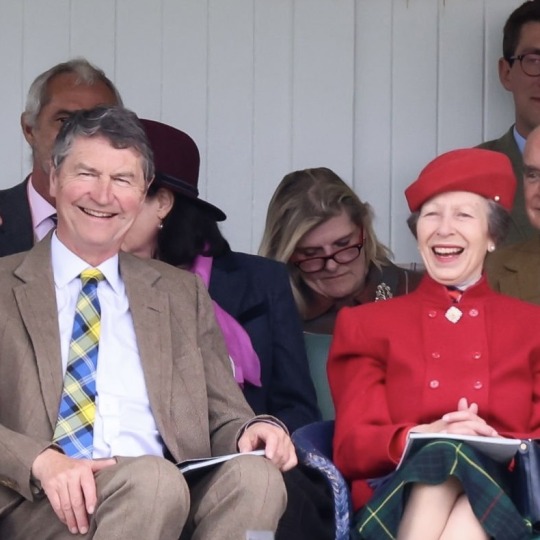
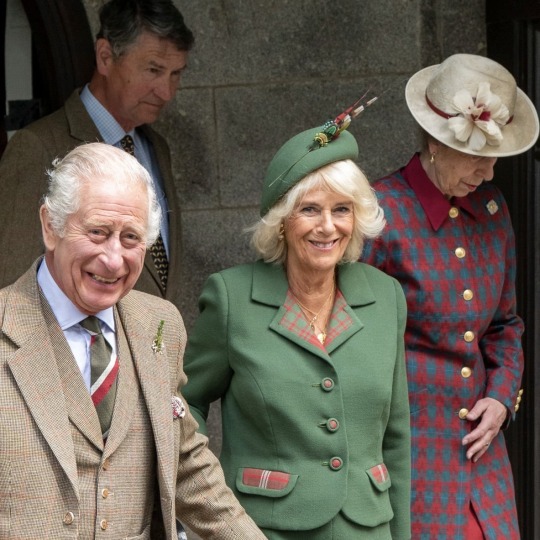
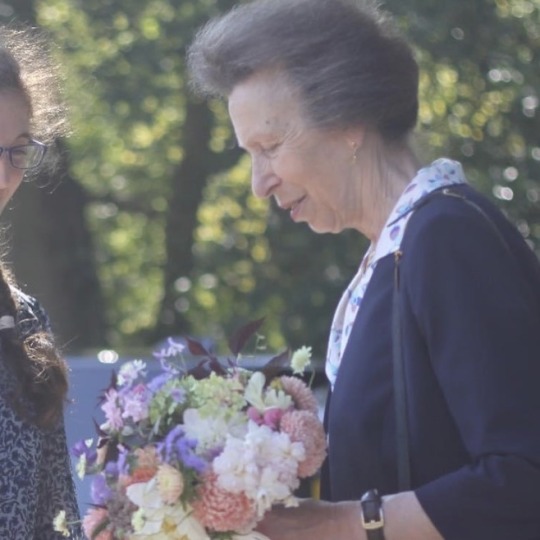
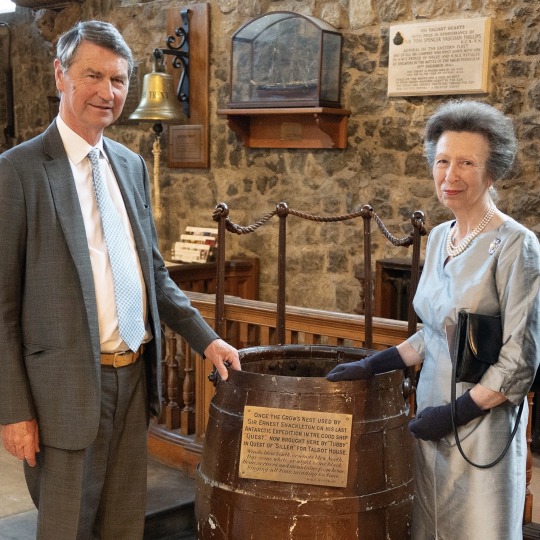

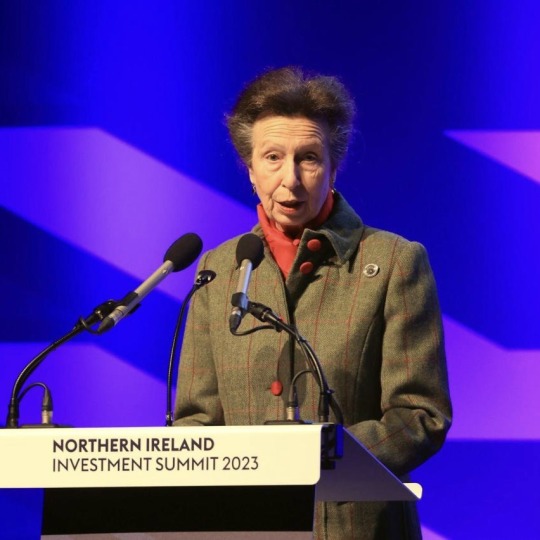
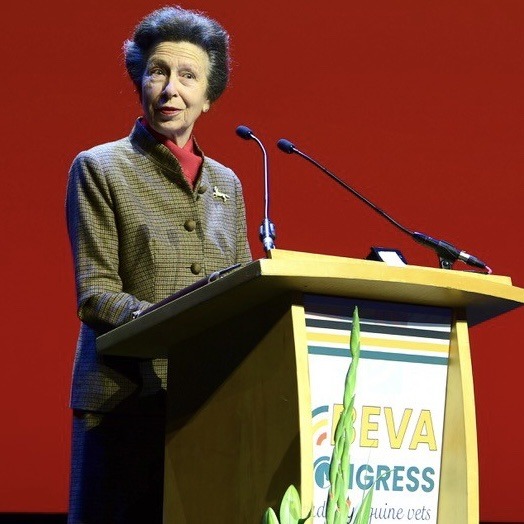

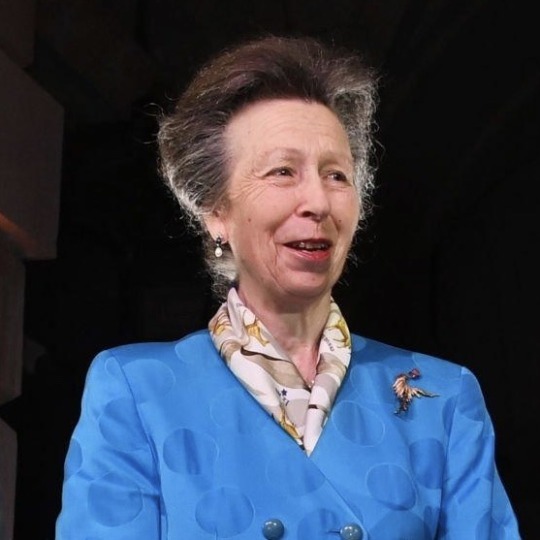
The Princess Royal’s Official Engagements in September 2023
02/09 The King and Queen, Princess Anne and Sir Tim attended the Braemar Gathering at the Princess Royal and Duke of Fife Memorial Park. 🏴
03/09 (not counted) The King, Queen, Princess Anne, Sir Tim, PM Rishi Sunak and Akshata Murphy attended the Divine Service at Crathie Kirk Church. ⛪️🏴
06/09 (unofficial) Princess Anne, along with the Prince and Princess of Wales recorded a special episode of the Good, the Bad and the Rugby, with Mike Tindall, James Haskell and Alex Payne at Windsor Castle. 🏉
07/09 As President of the Riding for the Disabled Association, visited Digswell Place Group, Digswell Place Stables, Welwyn Garden City, to mark its 50th Anniversary. 🐎
As President of UK Fashion and Textile Association, visited MAES London Womenswear Manufacturer. 👗
Sir Tim represented Princess Anne at a Service of Thanksgiving for Sir Matthew Farrer (former Solicitor to the Late Queen) at St Magnus-The-Martyr Church in London. ⛪️
As Patron of the South Georgia Heritage Trust Princess Anne and Sir Tim, attended the Return of Sir Ernest Shackleton’s Quest Crow’s Nest Service at All Hallows by the Tower, followed by a Dinner at Trinity House. 🗺️🍽️
08/09 Participated in a Meeting via video link in her role of Chairman of the International Olympic Committee Members Election Commission. 🎥💻
11/09 At Gatcombe Park;
Presented The Princess Royal Award and Royal Dairy Innovation Award. 🏆
Held a Management Team Meeting for the Chaffinch Trust. 💼
Held a Management Team Meeting for Give Them a Sporting Chance. 🏏
12/09 As Patron of the Boston Stump Restoration and Development Appeal, visited completed restoration work at St Botolph's Church in Boston, Lincolnshire. ⛪️
As Patron of Magpas Air Ambulance Capital Campaign, opened a new Air Base at Alconbury Weald. 🚁
As Patron of Maritime UK, attended the London International Shipping Week Tenth Anniversary Reception at Mansion House. 🚢
13/09 In Northern Ireland Princess Anne;
Attended the Department for Business and Trade’s Northern Ireland Business Summit at the International Conference Centre Belfast. 💼
As Patron of the International Sheep Dog Society, lattended the World Sheep Dog Trials at Gill Hall Estate, Dromore. 🐑🐶
Unveiled a Royal British Legion Community Bench in Dromore Square, Dromore. 🌹
Attended the Department for Business and Trade’s Northern Ireland Business Summit Reception at Hillsborough Castle. 👔🇮🇪
14/09 Attended the British Equine Veterinary Association 2023 Congress at the International Convention Centre in Birmingham. 🩺🐴
As Patron of the Butler Trust visited Stonnall Road Approved Premises in Walsall. 🏠
Opened the Firefly Woods at Dorothy House Hospice, Winsley House. She unveiled a firefly dedicated to her late parents. 💡
15/09 As Patron of the Restorative Justice Council, opened the Restorative Justice Council Inaugural Northern Ireland Conference in Belfast, Northern Ireland. 🇮🇪⚖️
As Chancellor of the University of the Highlands and Islands, attended the North, West and Hebrides Annual Graduation Ceremony and Celebration of Success and Achievement at St Peter’s and St Andrew’s Church, Thurso. 🏴🎓
18/09 The Princess Royal, As Guardian of Give Them A Sporting Chance, visited the Rivertime Boat Trust at the River and Rowing Museum in Henley on Thames. 🦽🚣♀️
As Patron of the National Transport Trust, attended the Annual Awards Ceremony at Fawley Hill Transport Museum, Henley-on-Thames. 🚂🥇
19/09 Visited the Our Cow Molly icecream parlour and dairy farm at Cliffe House Farm, Dungworth, Sheffield. 🍦🐮
Launched the Ethel Trust Community Barge PEARL at Victoria Quays and attended a Reception at the Quays Hotel Sheffield. 🚤
As Patron of the Royal College of Midwives, visited Doncaster Royal Infirmary Women’s and Children’s Hospital. 👶🤰
20/09 As Patron of Police Treatment Centres, visited the St Andrews Centre in Harrogate. 👮♀️
Visited Claro Enterprises Community Workshop, Harrogate, to mark its 30th anniversary. 🎂
Visited Woods of Harrogate Limited Fine Linens Company in Harrogate. 🧖♀️
Visited Hollybank Trust Care Centre, in Mirfield, to mark its 70th Anniversary. 🩺
21/09 Visited Jaguar Land Rover Halewood Vehicle Plant to mark the 60th anniversary of its opening in Liverpool. 🚙
As President of the British Olympic Association, attended an Executive Board Meeting in London W1. 💼
22/09 With Sir Tim opened the Aberdeen South Harbour Expansion Project at the Port of Aberdeen. ⛴️
26/09 Held an Investiture ceremony at Windsor Castle. 🎖️
Opened the renovated Old War Office Building, Whitehall in London. 🏢
Attended the Royal Warrant Holders Association’s President’s Reception at Westminster Abbey. 📑🍾
As Patron of Mercy Ships International, attended a 45th Anniversary Dinner onboard The Elizabethan, sailing on the River Thames. 🛥️🍽️
27/09 Held two Investiture ceremonies at Windsor Castle. 🎖️
As President of World Horse Welfare, attended a Reception at Hyde Park Barracks, Knightsbridge, London. 🐎
As Patron of Opportunity International UK, attended a Dinner at Evercore in London. 🌍
28/09 As President of the UK Fashion and Textile Association, attended the Sustainability in UK Textiles Conference at Drapers’ Hall, London. 👗
As Founders’ Patron and President, of the Benenden School & Society, attended the Centenary Global Conference “Inspiring Future Female Leaders”, opened the Seniors’ Courtyard, launched “Benenden 100” Centenary Book and attended the Benenden Society Reception at Benenden School in Kent. 🏫
29/09 Attended the Rededication Service of Southport War Memorial. 🫡
Total official engagements for Anne in July: 47
2023 total so far: 353
Total official engagements accompanied by Tim in July: 5
2023 total so far: 75
#hardest working royal 🫡#no choice but to stanne#this is based on the court circular#september 2023#and yes i’m doing a separate count for tim too#because i’m rooting for…#operation working royal tim#STILL WAITING CHARLES#not all engagements are on this post#if you want a full list plz dm me#princess anne#princess royal#tim laurence#timothy laurence
50 notes
·
View notes
Text


St. Stephen's Green ❤️
#sat on a bench here with friends and listened to patience#and its such a happy beautiful & peaceful memory for me ❤️#dublin#ireland
1 note
·
View note
Text
Saying Hello.
Marc Maron’s WTF podcast newsletter October 31st 2022
Mystical, People. I try to wrangle my mind as much as possible. It does wander. Predictable places and patterns. Usually not otherworldly. It will make some random connections and try to make sense of things that are beyond comprehension. I don’t want to drift. I’ve been delusional before. Something happened in Ireland. As many of you know that last time I was there was with Lynn. We both had some unexplained draw to the country. It held a magical space for both of us. Separately. It was something we found out we shared when we got to know each other. We both wanted to be there. The trip we took was after we went to the Gijón Film Festival in Spain. We spent almost two weeks in the country at two different houses. It was beautiful. It was the first and only time we traveled together. Going back I knew that the memories would be difficult. I knew that her absence would be felt. I stayed at the same hotel we stayed at in Dublin. I have pictures of her there. I could see where I took the picture. I could see her absence. I took a picture of a bench where she sat, empty. I have played at Vicar Street many times. I like the venue. I liked the crowd. They were great last Wednesday. As I made my way through the act it was all going over great. Then I came to the part where I switch tones, go a bit deeper and talk about grief and Lynn’s passing. Toward the end of the main piece from that section which describes the day she died the stage lights started fluctuating, going on and off. It was jarring. The audience felt it. It happened just as I was talking about her death and kept happening for five minutes. I said, ‘Hey, Lynn. Hi, baby.’ My eyes started tearing up. The audience was emotional. When I got off stage the lighting person said that had never happened before. When I got back to my hotel room I walked in, turned on the lamp on the desk and the bulb fizzled out. I said, ‘Ok, Lynn. I miss you too. I’m glad you’re here. You wanted to be here.’ I had to invest these moments with the mystical meaning they commanded. I had to look at them as good magic. I had to believe she was just saying hello and that she was there. That is where she resides now. Ireland. That is where she wanted to be, that is where she is. Why not?

9 notes
·
View notes